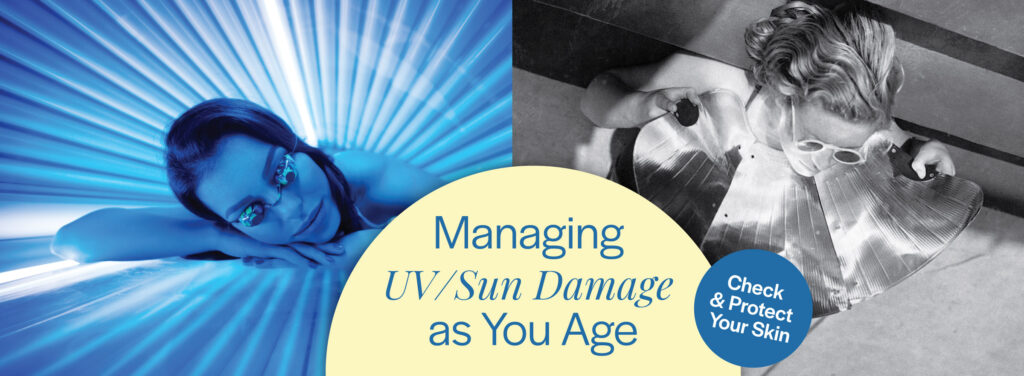Managing UV/Sun Damage as You Age

Tanning may have seemed harmless when you were young, but as you got older, you realized it came at an expense, namely wrinkles, sunspots, and possibly skin cancer. If you tanned over your lifetime, there’s no need to feel guilty. Plenty of people did it and it was popular for quite some time. You, or people around you, may have taken all types of steps to achieve bronzed skin. Whether you baked outside with foil reflectors and baby oil or frequently visited the tanning salon (if that’s you, know that you are not alone!)…it’s time for a skin check.
If you took those actions back in the day, fast forward to 2022, and that’s a substantial amount of accumulated sun damage. Many people who started tanning decades ago are now experiencing the negative impact of skin cancer. Although skin cancer sounds scary, it’s also highly treatable when caught early.
What are the Risk Factors for Developing Skin Cancer? Skin cancer is the most common type of cancer in the United States, and it can occur anywhere on the body. The main risk factors for skin cancer are exposure to ultraviolet (UV) radiation from the sun or tanning beds, fair skin that burns quickly, a history of sunburns, and a family history of skin cancer. While anyone can develop skin cancer, it is more common in people over 50. People with lighter skin color are also at greater risk of developing skin cancer.
How Can You Tell if You Have Skin Cancer? If you’re concerned about skin cancer, there are a few things you can look for to determine if you might have the condition. The most common sign of skin cancer is a change in the color, size, shape, or feel of a mole or other spot on the skin. You should also watch out for new lesions or growths on the skin and sores that don’t heal. If you notice any of these changes, it’s essential to see a doctor for a diagnosis.
What are the Different Types of Skin Cancer? There are several different types of skin cancer, and each one has its own unique set of symptoms. The most common types of skin cancer are melanoma, basal cell carcinoma, and squamous cell carcinoma. Melanoma is the most serious type of skin cancer, and it can be deadly if not treated early.
How Can You Prevent Skin Cancer from Happening? You can do many things to reduce your risk of developing skin cancer. The most important is to protect yourself from UV radiation by using sunscreen, wearing a hat and sunglasses, and avoiding sun exposure during peak hours. You should also avoid tanning beds and check your skin regularly for any changes that might be signs of cancer.
Skin cancer is a serious disease, but it’s also highly treatable when caught early. Sun exposure is the leading cause of skin cancer, so it’s essential to protect yourself from UV radiation. Prevention is key, so avoid tanning beds, use sunscreen, and avoid sun exposure when possible.
For more ways to prevent aging, read our article on “5 ways to turn back the clock”.
If you’re concerned about skin cancer, schedule an appointment with one of our providers today.





